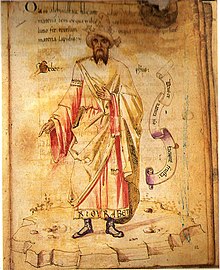Al-Jahiz
Arabic writer (776–869)
(Redirected from Jahiz of Basra)
Abū ʿUthman ʿAmr ibn Baḥr al-Kinānī al-Baṣrī (Arabic: أبو عثمان عمرو بن بحر الكناني البصري), commonly known as al-Jāḥiẓ (Arabic: الجاحظ, bug eyes, born 776; died December 868/January 869) was an Arab prose writer and author of works of literature, Mu'tazili theology, and politico-religious polemics.


Quotes
edit- A noble man need not pretend to be virtuous,
any more than a well-spoken man feigns eloquence.
When a man exaggerates his qualities
it is because of something lacking in him;
the bully gives himself airs
because he is conscious of his weakness.
Pride is ugly in all men … it is worse than cruelty, which is the worst kind of sins, and humility is better than clemency, which is the best of all good deeds.- The Book of Misers
- The book is silent as long as you need silence,
eloquent whenever you want discourse.
He never interrupts you if you are engaged
but if you feel lonely he will be a good companion.
He is a friend who never deceives or falters you,
and he is a companion who does not grow tired of you.- The Book of Animals
- Everybody agrees that there is no people on earth in whom generosity is as universally well developed as the Zanj. These people have a natural talent for dancing to the rhythm of the tambourine, without needing to learn it. There are no better singers anywhere in the world, no people more polished and eloquent, and no people less given to insulting language. No other nation can surpass them in bodily strength and physical toughness. One of them will lift huge blocks and carry heavy loads that would be beyond the strength of most Bedouins or members of other races. They are courageous, energetic, and generous, which are the virtues of nobility, and also good-tempered and with little propensity to evil. They are always cheerful, smiling, and devoid of malice, which is a sign of noble character.
- Medieval Sourcebook: Abû Ûthmân al-Jâhith: From The Essays, c. 860 CE". Retrieved 2 October 2014. [1]
- The Zanj say that God did not make them black to disfigure them; rather it is their environment that made them so. The best evidence of this is that there are black tribes among the Arabs, such as the Banu Sulaim bin Mansur, and that all the peoples settled in the Harra, besides the Banu Sulaim are black. These tribes take slaves from among the Ashban to mind their flocks and for irrigation work, manual labor, and domestic service, and their wives from among the Byzantines; and yet it takes less than three generations for the Harra to give them all the complexion of the Banu Sulaim. This Harra is such that the gazelles, ostriches, insects, wolves, foxes, sheep, asses, horses and birds that live there are all black. White and black are the results of environment, the natural properties of water and soil, distance from the sun, and intensity of heat. There is no question of metamorphosis, or of punishment, disfigurement or favor meted out by Allah. Besides, the land of the Banu Sulaim has much in common with the land of the Turks, where the camels, beasts of burden, and everything belonging to these people is similar in appearance: everything of theirs has a Turkish look.
- Medieval Sourcebook: Abû Ûthmân al-Jâhith: From The Essays, c. 860 CE". Retrieved 2 October 2014. [2]
Quotes about Al-Jahiz
edit- The whole question of blackness was discussed in a special essay by Jahiz of Basra (ca. 776-869), one of the greatest prose writers in classical Arabic literature and said by some of his biographers to be of partly African descent. Entitled "The Boast of the Blacks against the Whites,"" the essay purports to be a defense of the dark-skinned peoples-and especially of the Zanj, the blacks of East Africa-against their detractors, refuting the accusations commonly brought against them and setting forth their qualities and achievements, with a wealth of poetic illustration... To those who ask, "How is it that we have never seen a Zanji who had the intelligence even of a woman or of a child?" the answer, says Jahiz, is that the only Zanj they knew were slaves of low origin and from outlying and backward areas. If they judged by their experience of Indian slaves, would they have any notion of Indian science, philosophy, and art? Obviously not-and the same is true of the black lands. Jahiz also defends the equality of blacks as marriage partners and notes the paradox that discrimination against them first arose after the advent of Islam: At is part of your ignorance," he makes the blacks say, "that in the time of heathendom [i.e., in pre-Islamic Arabia] you regarded us as good enough to marry your women, yet when the justice of Islam came, you considered this wrong."
- Lewis, B. (1992). Race and slavery in the Middle East: An historical enquiry. New York: Oxford University Press. Chapter 4